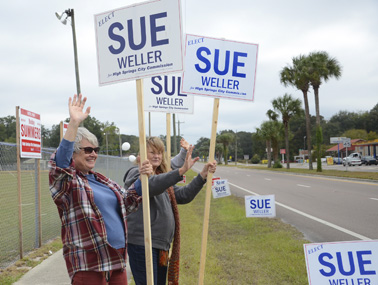
Photo/CARL MCKINNEY: Sue Weller, right, campaigns with her supporters last Tuesday prior to the election.
HIGH SPRINGS – Tension was high Tuesday evening as candidates and supporters waited for election results at the High Springs Civic Center on U.S. Highway 441.
Candidates and poll watchers carefully observed the process as officials checked and double-checked the tallies in the race for a single seat on the High Springs City Commission between incumbent Sue Weller and challenger Bobby Summers.
City Clerk Jenny Parham announced the final election results to the waiting crowd at 7:50 p.m. to a resounding cheer from Weller’s supporters.
Out of around 3,600 registered High Springs’ voters, a total of only 712 ballots were cast during this election, with 373 going to Sue Weller, giving her the lead over Bobby Summers’ 325 votes. Of those ballots cast, 55 were submitted as absentee ballots, about average for a local election, said Parham.
Weller thanked her supporters for carrying her through the election.
“When the ballot numbers were read, my first feeling was relief,” Weller said. “It was a close race, but I think the citizens want our community to move forward and stop bickering.”
As far as her thoughts on the city’s future, Weller said she would like to see the city continue with plans to develop the downtown area and for the commissioners to work together for the benefit of all of the citizens.
“In the past, we have had a negative reputation, which has hurt us financially as well as being an embarrassment for our citizens.”
Challenger Bobby Summers made a few brief comments.
“The people spoke and that’s the way it is,” he said. “It was a hard-fought race and she came out on top.”
The night was not without incidents.
There was an electrical problem at Precinct 60, located at Fellowship Baptist Church of High Springs. An electrical surge caused a short in one of the voting machines when it was plugged in. No votes had been cast on that machine, and a new one was sent out to the site by county election officials and was properly certified in view of both candidates and the poll workers. Tests were run to make sure the new machine had been properly secured and was running efficiently.
Everything was back on track by 9 a.m., said City Manager Ed Booth.
Although the ballots were counted and the numbers were announced Tuesday night, the canvassing board must still meet in a public forum to audit and certify the election results. That meeting will take place Thursday, Nov. 7 at City Hall. Parham said that the time will be announced on the city’s web page, but could be as early as 9 a.m., if the county elections office is able to verify the four provisional ballots early enough.
The city charter lists the canvassing board members as the city manager, city clerk and city attorney.
Weller, a native Floridian and graduate of the University of Florida, has served as commissioner for the past three years and as mayor for the past year.
Weller will be sworn into office at the regular commission meeting on Nov. 14, and the new commission will vote to elect a mayor for the upcoming year.
# # #
Email cwalker@
alachuatoday.com
Add a comment


